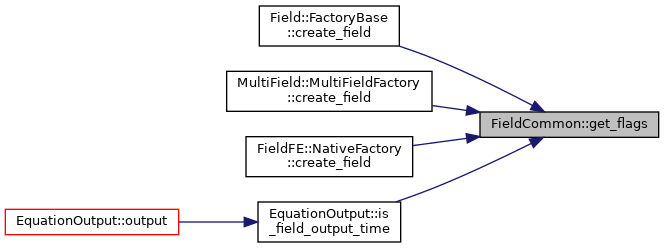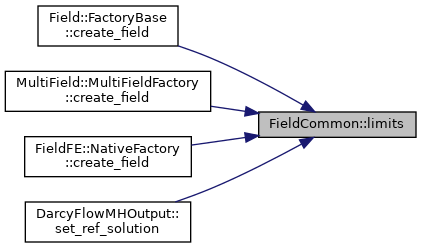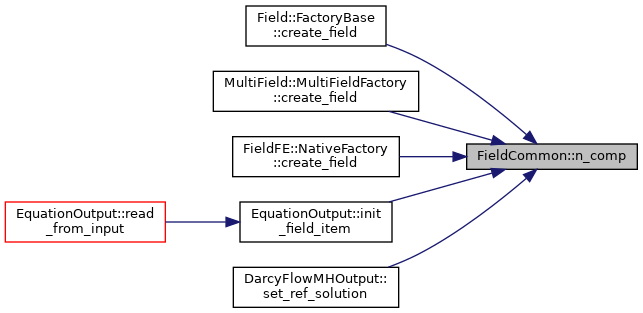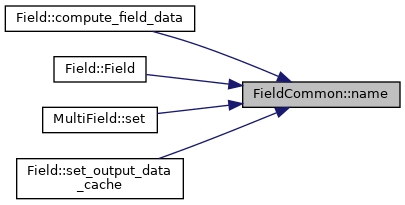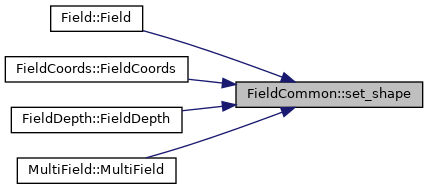Common abstract parent of all Field<...> classes. More...
#include <field_common.hh>
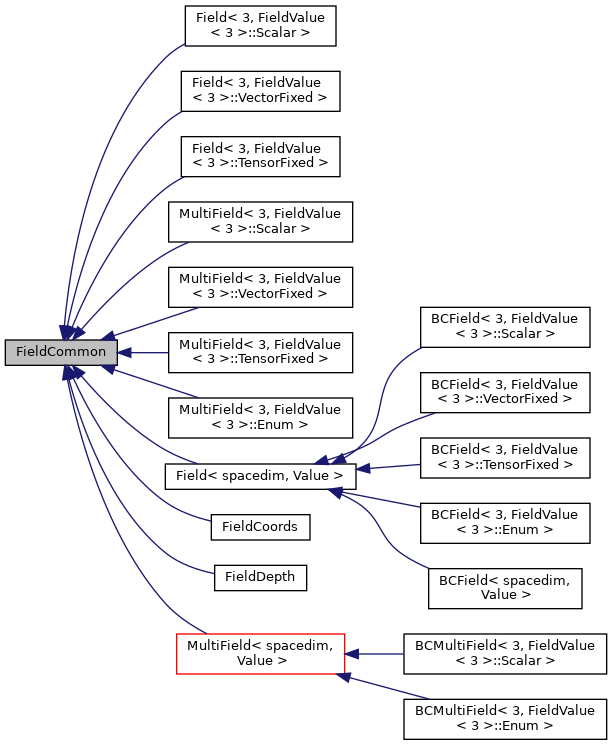

Classes | |
| struct | MessageData |
| Store data of one initialization message. More... | |
| struct | SharedData |
Public Member Functions | |
| TYPEDEF_ERR_INFO (EI_Time, double) | |
| TYPEDEF_ERR_INFO (EI_Field, std::string) | |
| TYPEDEF_ERR_INFO (EI_FieldInputName, std::string) | |
| TYPEDEF_ERR_INFO (EI_FieldName, std::string) | |
| TYPEDEF_ERR_INFO (EI_RegId, unsigned int) | |
| TYPEDEF_ERR_INFO (EI_RegLabel, std::string) | |
| DECLARE_INPUT_EXCEPTION (ExcNonascendingTime,<< "Non-ascending time: "<< EI_Time::val<< " for field "<< EI_Field::qval<< ".\n") | |
| DECLARE_INPUT_EXCEPTION (ExcMissingDomain,<< "Missing domain specification (region or r_id) in the field descriptor:") | |
| DECLARE_EXCEPTION (ExcFieldMeshDifference,<< "Two copies of the field "<< EI_Field::qval<< "call set_mesh with different arguments.\n") | |
| DECLARE_INPUT_EXCEPTION (ExcMissingFieldValue,<< "Missing value of the input field "<< EI_FieldInputName::qval<< " ("<< EI_FieldName::qval<< ") on region ID: "<< EI_RegId::val<< " label: "<< EI_RegLabel::qval<< ".\n") | |
| FieldCommon & | name (const string &name) |
| FieldCommon & | description (const string &description) |
| FieldCommon & | input_default (const string &input_default) |
| FieldCommon & | units (const UnitSI &units) |
| Set basic units of the field. More... | |
| FieldCommon & | set_limits (double min, double max=std::numeric_limits< double >::max()) |
| FieldCommon & | input_selection (Input::Type::Selection element_selection) |
| FieldCommon & | output_type (OutputTime::DiscreteSpace rt) |
| FieldCommon & | flags (FieldFlag::Flags::Mask mask) |
| FieldCommon & | flags_add (FieldFlag::Flags::Mask mask) |
| void | set_components (const std::vector< string > &names) |
| virtual void | set_mesh (const Mesh &mesh)=0 |
| virtual void | set_input_list (const Input::Array &list, const TimeGovernor &tg)=0 |
| const std::string & | input_name () const |
| const std::string & | name () const |
| const std::string | description () const |
| const std::string & | input_default () const |
| const UnitSI & | units () const |
| std::pair< double, double > | limits () const |
| OutputTime::DiscreteSpace | get_output_type () const |
| unsigned int | n_comp () const |
| std::string | full_comp_name (unsigned int i_comp) const |
| const Mesh * | mesh () const |
| FieldFlag::Flags & | flags () |
| FieldFlag::Flags | get_flags () const |
| double | time () const |
| bool | is_jump_time () |
| unsigned int | input_list_size () const |
| virtual bool | is_constant (Region reg)=0 |
| virtual FieldResult | field_result (RegionSet region_set) const =0 |
| Indicates special field states. More... | |
| virtual std::string | get_value_attribute () const =0 |
| bool | changed () const |
| virtual IT::Instance | get_input_type ()=0 |
| virtual IT::Array | get_multifield_input_type ()=0 |
| void | mark_input_times (const TimeGovernor &tg) |
| virtual bool | set_time (const TimeStep &time, LimitSide limit_side)=0 |
| virtual void | copy_from (const FieldCommon &other)=0 |
| virtual void | field_output (std::shared_ptr< OutputTime > stream, OutputTime::DiscreteSpace type)=0 |
| virtual std::vector< const FieldCommon * > | set_dependency (unsigned int i_reg) const =0 |
| void | set_component_index (unsigned int idx) |
| bool | is_multifield () const |
| virtual void | cache_reallocate (const ElementCacheMap &cache_map, unsigned int region_idx) const =0 |
| virtual void | cache_update (ElementCacheMap &cache_map, unsigned int region_patch_idx) const =0 |
| virtual FieldCommon * | get_component (FMT_UNUSED unsigned int idx) |
| virtual FieldValueCache< double > * | value_cache ()=0 |
| virtual const FieldValueCache< double > * | value_cache () const =0 |
| virtual void | set_output_data_cache (FMT_UNUSED OutputTime::DiscreteSpace space_type, FMT_UNUSED std::shared_ptr< OutputTime > stream) |
| Create and set shared_ptr to ElementDataCache. Used only in descendant Field<>. More... | |
| virtual void | fill_data_value (FMT_UNUSED const std::vector< int > &offsets) |
| Fill data to ElementDataCache on given patch. More... | |
| virtual void | fill_observe_value (FMT_UNUSED std::shared_ptr< ElementDataCacheBase > output_cache_base, FMT_UNUSED const std::vector< int > &offsets) |
| Fill data to ElementDataCache on given patch. More... | |
| void | set_default_fieldset (FieldSet &default_fs) |
| virtual | ~FieldCommon () |
| uint | n_shape () const |
| Return number of shape components. More... | |
| void | set_time_result_changed () |
| Manually mark flag that the field has been changed. More... | |
Static Public Member Functions | |
| static IT::Record | field_descriptor_record (const string &record_name) |
| static const std::string | field_descriptor_record_description (const string &record_name) |
| static bool | print_message_table (ostream &stream, std::string equation_name) |
Public Attributes | |
| std::vector< uint > | shape_ |
Protected Types | |
| enum class | TimeStatus { changed , constant , changed_forced , unknown } |
Protected Member Functions | |
| FieldCommon () | |
| FieldCommon (const FieldCommon &other) | |
| void | set_history_changed () |
| void | set_shape (uint n_rows, uint n_cols) |
Protected Attributes | |
| std::string | name_ |
| std::shared_ptr< SharedData > | shared_ |
| TimeStatus | set_time_result_ |
| double | last_time_ = -numeric_limits<double>::infinity() |
| LimitSide | last_limit_side_ = LimitSide::left |
| bool | is_jump_time_ |
| OutputTime::DiscreteSpace | default_output_data_ = OutputTime::ELEM_DATA |
| unsigned int | component_index_ |
| bool | multifield_ |
| FieldFlag::Flags | flags_ = FieldFlag::declare_input & FieldFlag::equation_input & FieldFlag::allow_output |
| Field flags. Default setting is "an equation input field, that can read from user input, and can be written to output". More... | |
Static Protected Attributes | |
| static const unsigned int | history_length_limit_ =3 |
| static std::vector< MessageData > | messages_data_ = std::vector<FieldCommon::MessageData>() |
| Vector of data of initialization messages. More... | |
Friends | |
| std::ostream & | operator<< (std::ostream &stream, const FieldCommon &field) |
Detailed Description
Common abstract parent of all Field<...> classes.
We need common ancestor in order to keep a list of all fields in one EqData object and allow collective operations like set_time or init_from_input.
Definition at line 77 of file field_common.hh.
Member Enumeration Documentation
◆ TimeStatus
|
strongprotected |
Result of last set time method
| Enumerator | |
|---|---|
| changed | |
| constant | |
| changed_forced | |
| unknown | |
Definition at line 680 of file field_common.hh.
Constructor & Destructor Documentation
◆ ~FieldCommon()
|
virtual |
Virtual destructor.
Definition at line 118 of file field_common.cc.
◆ FieldCommon() [1/2]
|
protected |
Private default constructor. Should be used only through Field<...>
Definition at line 31 of file field_common.cc.
◆ FieldCommon() [2/2]
|
protected |
Private copy constructor. Should be used only through Field<...>
Definition at line 45 of file field_common.cc.
Member Function Documentation
◆ cache_reallocate()
|
pure virtual |
Reallocate field value cache of Field on given region.
Implemented in MultiField< spacedim, Value >, MultiField< 3, FieldValue< 3 >::Scalar >, MultiField< 3, FieldValue< 3 >::VectorFixed >, MultiField< 3, FieldValue< 3 >::TensorFixed >, MultiField< 3, FieldValue< 3 >::Enum >, Field< spacedim, Value >, Field< 3, FieldValue< 3 >::Scalar >, Field< 3, FieldValue< 3 >::VectorFixed >, and Field< 3, FieldValue< 3 >::TensorFixed >.
◆ cache_update()
|
pure virtual |
Read data to cache for appropriate elements given by ElementCacheMap object.
Implemented in MultiField< spacedim, Value >, MultiField< 3, FieldValue< 3 >::Scalar >, MultiField< 3, FieldValue< 3 >::VectorFixed >, MultiField< 3, FieldValue< 3 >::TensorFixed >, MultiField< 3, FieldValue< 3 >::Enum >, FieldDepth, FieldCoords, Field< spacedim, Value >, Field< 3, FieldValue< 3 >::Scalar >, Field< 3, FieldValue< 3 >::VectorFixed >, and Field< 3, FieldValue< 3 >::TensorFixed >.

◆ changed()
|
inline |
Returns true if set_time_result_ is not TimeStatus::constant. Returns the same value as last set_time method.
Definition at line 361 of file field_common.hh.

◆ copy_from()
|
pure virtual |
Check that other is instance of the same Field<..> class and perform assignment. Polymorphic copy.
The copy is performed only if *this have set flag 'input_copy'. If *this have set also the flag 'decare_input' the copy is performed only if the input_list is empty.
Implemented in MultiField< spacedim, Value >, MultiField< 3, FieldValue< 3 >::Scalar >, MultiField< 3, FieldValue< 3 >::VectorFixed >, MultiField< 3, FieldValue< 3 >::TensorFixed >, MultiField< 3, FieldValue< 3 >::Enum >, Field< spacedim, Value >, Field< 3, FieldValue< 3 >::Scalar >, Field< 3, FieldValue< 3 >::VectorFixed >, and Field< 3, FieldValue< 3 >::TensorFixed >.

◆ DECLARE_EXCEPTION()
| FieldCommon::DECLARE_EXCEPTION | ( | ExcFieldMeshDifference | , |
| << "Two copies of the field "<< EI_Field::qval<< "call set_mesh with different arguments.\n" | |||
| ) |
◆ DECLARE_INPUT_EXCEPTION() [1/3]
| FieldCommon::DECLARE_INPUT_EXCEPTION | ( | ExcMissingDomain | , |
| << "Missing domain specification (region or r_id) in the field descriptor:" | |||
| ) |
◆ DECLARE_INPUT_EXCEPTION() [2/3]
| FieldCommon::DECLARE_INPUT_EXCEPTION | ( | ExcMissingFieldValue | , |
| << "Missing value of the input field "<< EI_FieldInputName::qval<< " ("<< EI_FieldName::qval<< ") on region ID: "<< EI_RegId::val<< " label: "<< EI_RegLabel::qval<< ".\n" | |||
| ) |
◆ DECLARE_INPUT_EXCEPTION() [3/3]
| FieldCommon::DECLARE_INPUT_EXCEPTION | ( | ExcNonascendingTime | , |
| << "Non-ascending time: "<< EI_Time::val<< " for field "<< EI_Field::qval<< ".\n" | |||
| ) |
◆ description() [1/2]
|
inline |
Definition at line 249 of file field_common.hh.
◆ description() [2/2]
|
inline |
Set description of the field, used for description of corresponding key in documentation.
Definition at line 128 of file field_common.hh.
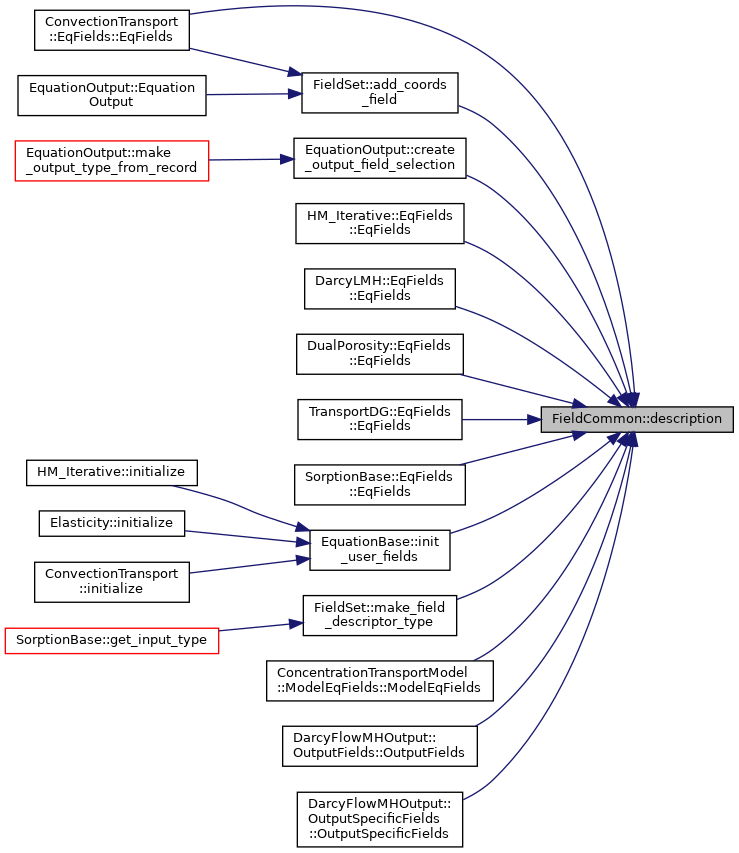
◆ field_descriptor_record()
|
static |
Common part of the field descriptor. To get finished record one has to add keys for individual fields. This is done automatically using FieldSet::get_input_type().
Definition at line 59 of file field_common.cc.

◆ field_descriptor_record_description()
|
static |
Create description of field descriptor record.
Definition at line 72 of file field_common.cc.

◆ field_output()
|
pure virtual |
Output the field. The parameter output_fields is checked for value named by the field name. If the key exists, then the output of the field is performed. If the key do not appear in the input, no output is done.
Implemented in MultiField< spacedim, Value >, MultiField< 3, FieldValue< 3 >::Scalar >, MultiField< 3, FieldValue< 3 >::VectorFixed >, MultiField< 3, FieldValue< 3 >::TensorFixed >, MultiField< 3, FieldValue< 3 >::Enum >, Field< spacedim, Value >, Field< 3, FieldValue< 3 >::Scalar >, Field< 3, FieldValue< 3 >::VectorFixed >, and Field< 3, FieldValue< 3 >::TensorFixed >.
◆ field_result()
|
pure virtual |
Indicates special field states.
Extension of the previous method. Return possible values from the enum FieldResult, see description there. The initial state is field_none, if the field is correctly set on all regions of the region_set given as parameter we return state field_other or even more particular result.
Special field values spatially constant. Could allow optimization of tensor multiplication and tensor or vector addition. field_result_ should be set in constructor and in set_time method of particular Field implementation. We return value result_none, if the field is not initialized on the region of the given element accessor elm. Other possible results are: result_zeros, result_eye, result_ones, result_constant, result_other see FieldResult for explanation.
Multifield return most particular value that holds for all its subfields.
Implemented in MultiField< spacedim, Value >, MultiField< 3, FieldValue< 3 >::Scalar >, MultiField< 3, FieldValue< 3 >::VectorFixed >, MultiField< 3, FieldValue< 3 >::TensorFixed >, MultiField< 3, FieldValue< 3 >::Enum >, Field< spacedim, Value >, Field< 3, FieldValue< 3 >::Scalar >, Field< 3, FieldValue< 3 >::VectorFixed >, and Field< 3, FieldValue< 3 >::TensorFixed >.

◆ fill_data_value()
|
inlinevirtual |
Fill data to ElementDataCache on given patch.
Definition at line 500 of file field_common.hh.
◆ fill_observe_value()
|
inlinevirtual |
Fill data to ElementDataCache on given patch.
Definition at line 507 of file field_common.hh.
◆ flags() [1/2]
|
inline |
◆ flags() [2/2]
|
inline |
Set given mask to the field flags, ignoring default setting. Default setting is declare_input & equation_input & allow_output.
Definition at line 192 of file field_common.hh.
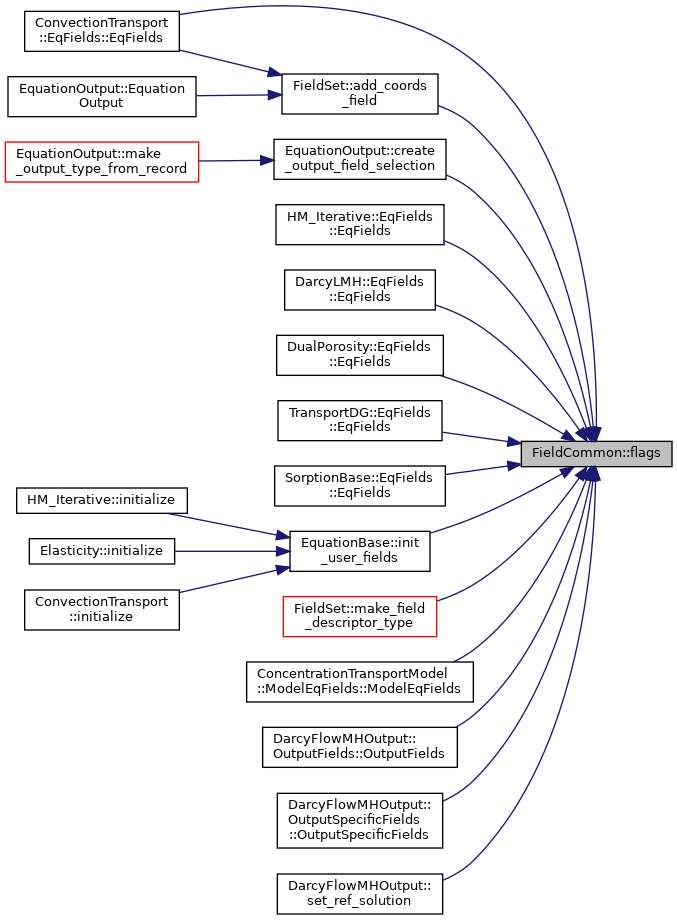
◆ flags_add()
|
inline |
Add given mask to the field flags.
Definition at line 198 of file field_common.hh.
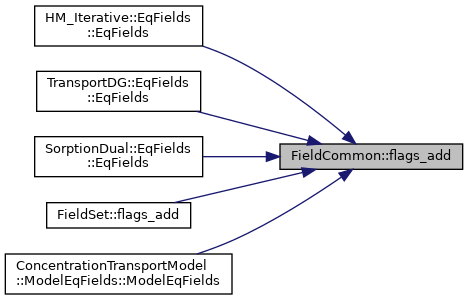
◆ full_comp_name()
|
inline |
Returns full name of subfield on i_comp position created from component name and field name.
If component name is empty returns only field name.
Definition at line 277 of file field_common.hh.

◆ get_component()
|
inlinevirtual |
Returns pointer to this (Field) or the sub-field component (MultiField).
Definition at line 477 of file field_common.hh.
◆ get_flags()
|
inline |
◆ get_input_type()
|
pure virtual |
Returns input type for particular field instance, this is reference to a static member input_type of the corresponding FieldBase class (i.e. with the same template parameters). This is used in FieldSet::make_field_descriptor_type.
Implemented in MultiField< spacedim, Value >, MultiField< 3, FieldValue< 3 >::Scalar >, MultiField< 3, FieldValue< 3 >::VectorFixed >, MultiField< 3, FieldValue< 3 >::TensorFixed >, MultiField< 3, FieldValue< 3 >::Enum >, FieldDepth, FieldCoords, Field< spacedim, Value >, Field< 3, FieldValue< 3 >::Scalar >, Field< 3, FieldValue< 3 >::VectorFixed >, and Field< 3, FieldValue< 3 >::TensorFixed >.

◆ get_multifield_input_type()
|
pure virtual |
Returns input type for MultiField instance. TODO: temporary solution, see multifield_
Implemented in MultiField< spacedim, Value >, MultiField< 3, FieldValue< 3 >::Scalar >, MultiField< 3, FieldValue< 3 >::VectorFixed >, MultiField< 3, FieldValue< 3 >::TensorFixed >, MultiField< 3, FieldValue< 3 >::Enum >, FieldDepth, FieldCoords, Field< spacedim, Value >, Field< 3, FieldValue< 3 >::Scalar >, Field< 3, FieldValue< 3 >::VectorFixed >, and Field< 3, FieldValue< 3 >::TensorFixed >.

◆ get_output_type()
|
inline |
◆ get_value_attribute()
|
pure virtual |
Return specification of the field value type in form of the string: [ <element type>, NRows, NCols]
Result is valid JSON (and/or flow style YAML). For multifields not implemented.
Implemented in MultiField< spacedim, Value >, MultiField< 3, FieldValue< 3 >::Scalar >, MultiField< 3, FieldValue< 3 >::VectorFixed >, MultiField< 3, FieldValue< 3 >::TensorFixed >, MultiField< 3, FieldValue< 3 >::Enum >, FieldDepth, FieldCoords, Field< spacedim, Value >, Field< 3, FieldValue< 3 >::Scalar >, Field< 3, FieldValue< 3 >::VectorFixed >, and Field< 3, FieldValue< 3 >::TensorFixed >.

◆ input_default() [1/2]
|
inline |
Definition at line 252 of file field_common.hh.
◆ input_default() [2/2]
|
inline |
Set default value for the field's key from which the default constant valued field will be constructed.
During the first call of the set_time method, we check that the field is defined on all regions. On regions where it is not set yet, we use given dflt string to get particular instance of FieldBase<> (see check_initialized_region_fields_). The default string is interpreted in the same way as if it appears in the input file as the value of the field. In particular it can be whole record with TYPE of the field etc. Most common choice is however mere constant.
Definition at line 140 of file field_common.hh.
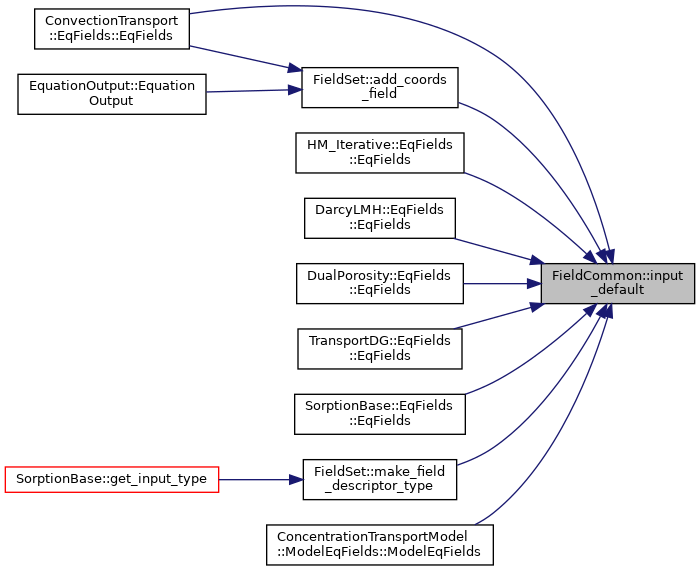
◆ input_list_size()
|
inline |
Returns number of field descriptors containing the field.
Definition at line 311 of file field_common.hh.
◆ input_name()
|
inline |
Getters.
Definition at line 243 of file field_common.hh.
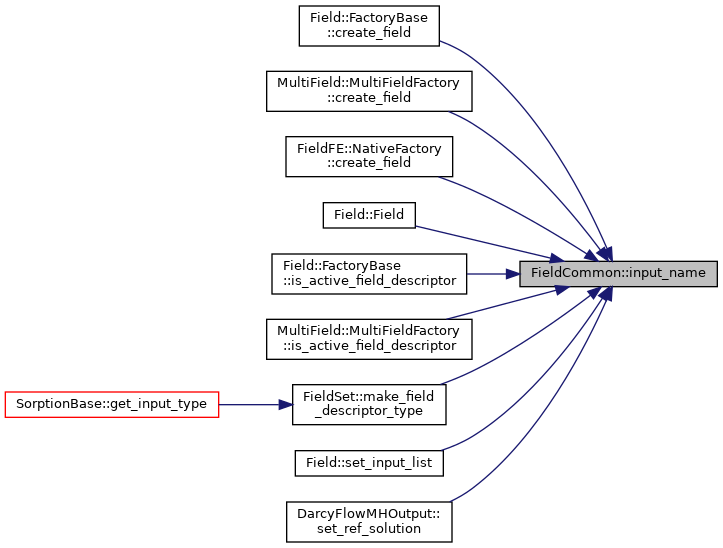
◆ input_selection()
|
inline |
For the fields returning "Enum", we have to pass the Input::Type::Selection object to the field implementations.
We must save raw pointer since selection may not be yet initialized (during static initialization phase).
Definition at line 172 of file field_common.hh.
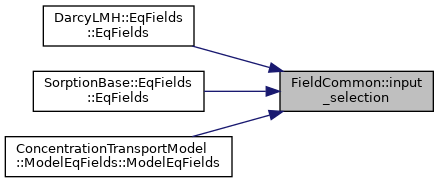
◆ is_constant()
|
pure virtual |
If the field on given region reg exists and is of type FieldConstant<...> the method method returns true otherwise it returns false. Then one can call ElementAccessor<spacedim>(mesh(), reg ) to construct an ElementAccessor elm pointing to "virtual" element on which Field::value returns constant value. Unlike the Field<>::field_result method, this one provides no value, so it have common header (arguments, return type) and could be part of FieldCommon and FieldSet which is useful in some applications.
TODO:Current implementation use virtual functions and can be prohibitively slow if called for every element. If this becomes necessary it is possible to incorporate such test into set_time method and in this method just return precomputed result.
Implemented in MultiField< spacedim, Value >, MultiField< 3, FieldValue< 3 >::Scalar >, MultiField< 3, FieldValue< 3 >::VectorFixed >, MultiField< 3, FieldValue< 3 >::TensorFixed >, MultiField< 3, FieldValue< 3 >::Enum >, Field< spacedim, Value >, Field< 3, FieldValue< 3 >::Scalar >, Field< 3, FieldValue< 3 >::VectorFixed >, and Field< 3, FieldValue< 3 >::TensorFixed >.

◆ is_jump_time()
|
inline |
Returns true if the field change algorithm for the current time set through the set_time method. This happen for all times in the field descriptors on the input of this particular field.
Definition at line 304 of file field_common.hh.

◆ is_multifield()
|
inline |
Return multifield_ flag. TODO: temporary solution
Definition at line 458 of file field_common.hh.

◆ limits()
|
inline |
◆ mark_input_times()
| void FieldCommon::mark_input_times | ( | const TimeGovernor & | tg | ) |
Pass through the input array input_list_, collect all times where the field could change and put appropriate time marks into global TimeMarks object. Introduced time marks have both given mark_type and type_input() type.
Further development:
- we have to distinguish "jump" times and "smooth" times
Definition at line 81 of file field_common.cc.

◆ mesh()
|
inline |
◆ n_comp()
|
inline |
◆ n_shape()
|
inline |
Return number of shape components.
Definition at line 536 of file field_common.hh.
◆ name() [1/2]
|
inline |
◆ name() [2/2]
|
inline |
Set name of the field. In fact there are two attributes set by this method.
The first is name used to identify the field as part of a FieldSet or MultiField objects. This name is permanent and can be set only by this method. Can be accessed by name() method. This name is also used at output.
The second is input_name_ that determines appropriate key name in the input field descriptor. This name is also set by this method, but is stored in the internal shared space which is overwritten during call of copy_from method or assignment operator. Can be accessed by input_name() mathod.
Definition at line 121 of file field_common.hh.
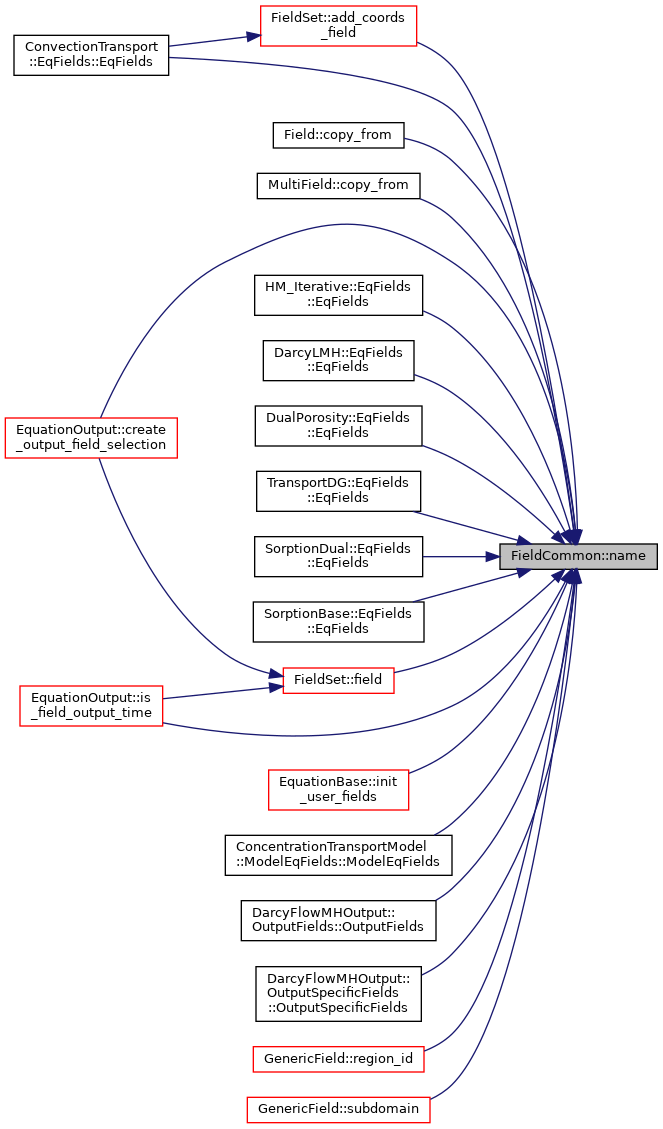
◆ output_type()
|
inline |
Output discrete space used in the output() method. Can be different for different field copies. one can choose between: data constant on elements, linear data given in nodes, and discontinuous linear data.
If not set explicitly by this method, the default value is OutputTime::ELEM_DATA
Definition at line 185 of file field_common.hh.

◆ print_message_table()
|
static |
Print stored messages to table.
Return true if messages_data_ vector is nonempty and clear its.
Definition at line 95 of file field_common.cc.
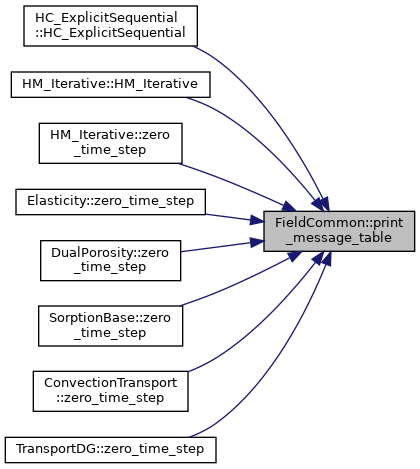
◆ set_component_index()
|
inline |
Sets component_index_
Definition at line 449 of file field_common.hh.

◆ set_components()
|
inline |
Set vector of component names. Set number of components for run-time sized vectors. This is used latter when we construct objects derived from FieldBase<...>.
n_comp_ is constant zero for fixed values, this zero is set by Field<...> constructors
Definition at line 208 of file field_common.hh.

◆ set_default_fieldset()
|
inline |
Setter of shared_->default_fieldset_
Sets FieldSet which is default owner of Field. This FieldSet is used during evaluation of user field in FieldFormula.
Definition at line 526 of file field_common.hh.
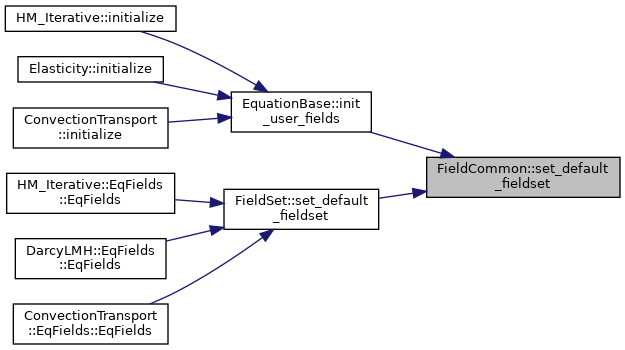
◆ set_dependency()
|
pure virtual |
Set reference of FieldSet to all instances of FieldFormula.
Implemented in MultiField< spacedim, Value >, MultiField< 3, FieldValue< 3 >::Scalar >, MultiField< 3, FieldValue< 3 >::VectorFixed >, MultiField< 3, FieldValue< 3 >::TensorFixed >, MultiField< 3, FieldValue< 3 >::Enum >, Field< spacedim, Value >, Field< 3, FieldValue< 3 >::Scalar >, Field< 3, FieldValue< 3 >::VectorFixed >, and Field< 3, FieldValue< 3 >::TensorFixed >.

◆ set_history_changed()
|
inlineprotected |
Invalidate last time in order to force set_time method update region_fields_.
Definition at line 566 of file field_common.hh.
◆ set_input_list()
|
pure virtual |
Set the data list from which field will read its input. It is list of "field descriptors". When reading from the input list we consider only field descriptors containing key of named by the field name. These field descriptors has to have times forming ascending sequence.
The list is used by set_time method to set field on individual regions to actual FieldBase descendants.
Implemented in MultiField< spacedim, Value >, MultiField< 3, FieldValue< 3 >::Scalar >, MultiField< 3, FieldValue< 3 >::VectorFixed >, MultiField< 3, FieldValue< 3 >::TensorFixed >, MultiField< 3, FieldValue< 3 >::Enum >, Field< spacedim, Value >, Field< 3, FieldValue< 3 >::Scalar >, Field< 3, FieldValue< 3 >::VectorFixed >, and Field< 3, FieldValue< 3 >::TensorFixed >.

◆ set_limits()
|
inline |
Set limits of value of the field.
Definition at line 159 of file field_common.hh.
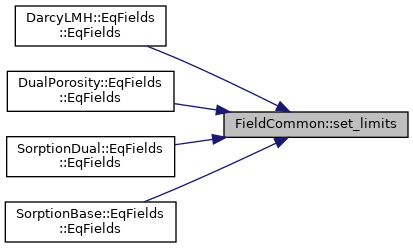
◆ set_mesh()
|
pure virtual |
Set internal mesh pointer.
Implemented in MultiField< spacedim, Value >, MultiField< 3, FieldValue< 3 >::Scalar >, MultiField< 3, FieldValue< 3 >::VectorFixed >, MultiField< 3, FieldValue< 3 >::TensorFixed >, MultiField< 3, FieldValue< 3 >::Enum >, FieldDepth, FieldCoords, Field< spacedim, Value >, Field< 3, FieldValue< 3 >::Scalar >, Field< 3, FieldValue< 3 >::VectorFixed >, and Field< 3, FieldValue< 3 >::TensorFixed >.

◆ set_output_data_cache()
|
inlinevirtual |
Create and set shared_ptr to ElementDataCache. Used only in descendant Field<>.
Definition at line 494 of file field_common.hh.
◆ set_shape()
◆ set_time()
Abstract method to update field to the new time level. Implemented by in class template Field<...>.
Return true if the value of the field was changed on some region. The returned value is also stored in changed_during_set_time data member.
Default values helps when creating steady field. Note that default TimeGovernor constructor set time to 0.0.
Different field copies can be set to different times.
TODO: update following: Set side of limit when calling set_time with jump time, i.e. time where the field change implementation on some region. Wee assume that implementations prescribe only smooth fields. This method invalidate result of changed() so it should be called just before set_time. Can be different for different field copies.
Implemented in MultiField< spacedim, Value >, MultiField< 3, FieldValue< 3 >::Scalar >, MultiField< 3, FieldValue< 3 >::VectorFixed >, MultiField< 3, FieldValue< 3 >::TensorFixed >, MultiField< 3, FieldValue< 3 >::Enum >, Field< spacedim, Value >, Field< 3, FieldValue< 3 >::Scalar >, Field< 3, FieldValue< 3 >::VectorFixed >, and Field< 3, FieldValue< 3 >::TensorFixed >.

◆ set_time_result_changed()
|
inline |
Manually mark flag that the field has been changed.
Definition at line 752 of file field_common.hh.
◆ time()
|
inline |
Returns time set by last call of set_time method. Can be different for different field copies.
Definition at line 297 of file field_common.hh.
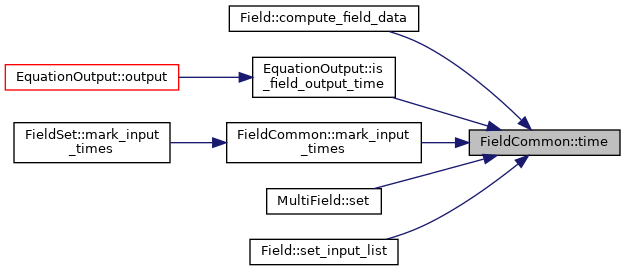
◆ TYPEDEF_ERR_INFO() [1/6]
| FieldCommon::TYPEDEF_ERR_INFO | ( | EI_Field | , |
| std::string | |||
| ) |
◆ TYPEDEF_ERR_INFO() [2/6]
| FieldCommon::TYPEDEF_ERR_INFO | ( | EI_FieldInputName | , |
| std::string | |||
| ) |
◆ TYPEDEF_ERR_INFO() [3/6]
| FieldCommon::TYPEDEF_ERR_INFO | ( | EI_FieldName | , |
| std::string | |||
| ) |
◆ TYPEDEF_ERR_INFO() [4/6]
| FieldCommon::TYPEDEF_ERR_INFO | ( | EI_RegId | , |
| unsigned int | |||
| ) |
◆ TYPEDEF_ERR_INFO() [5/6]
| FieldCommon::TYPEDEF_ERR_INFO | ( | EI_RegLabel | , |
| std::string | |||
| ) |
◆ TYPEDEF_ERR_INFO() [6/6]
| FieldCommon::TYPEDEF_ERR_INFO | ( | EI_Time | , |
| double | |||
| ) |
◆ units() [1/2]
|
inline |
Definition at line 255 of file field_common.hh.
◆ units() [2/2]
|
inline |
Set basic units of the field.
Currently, we use it only during output and we represents units just by a string.
TODO: Particular class for representing and conversion of various units would be more appropriate. This can allow specification of the units on the inptu, automatic conversion and the same on the output. Possibly this allow using Boost::Units library, however, it seems to introduce lot of boilerplate code. But can increase correctness of the calculations.
Definition at line 153 of file field_common.hh.
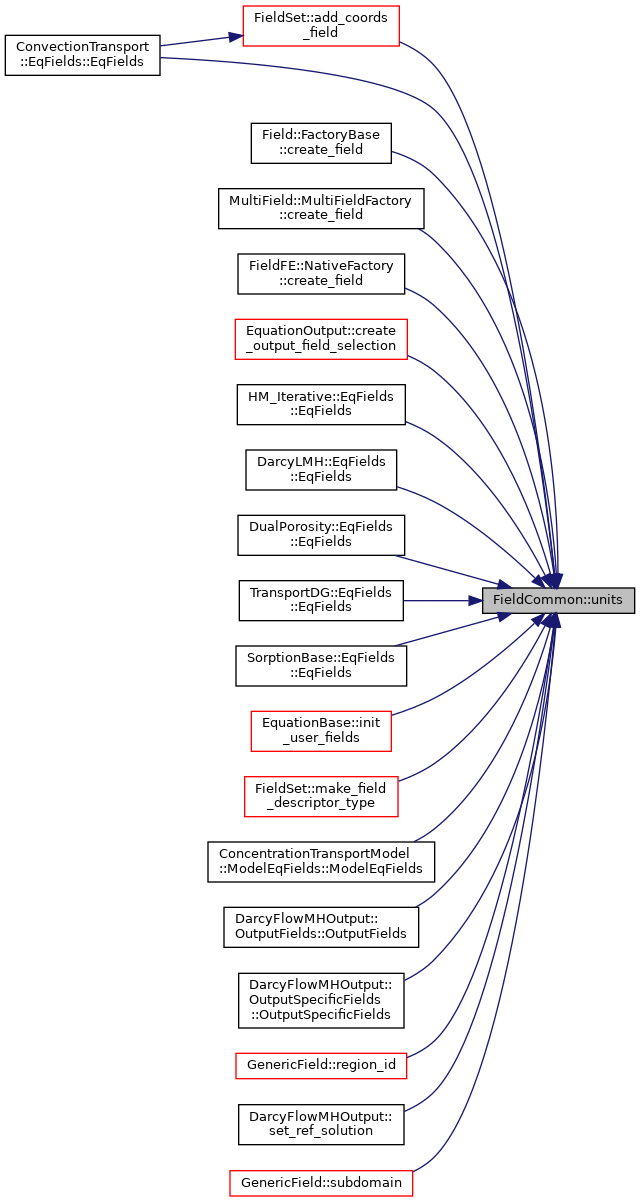
◆ value_cache() [1/2]
|
pure virtual |
Same as previous but return const pointer
Implemented in MultiField< spacedim, Value >, MultiField< 3, FieldValue< 3 >::Scalar >, MultiField< 3, FieldValue< 3 >::VectorFixed >, MultiField< 3, FieldValue< 3 >::TensorFixed >, MultiField< 3, FieldValue< 3 >::Enum >, FieldDepth, FieldCoords, Field< spacedim, Value >, Field< 3, FieldValue< 3 >::Scalar >, Field< 3, FieldValue< 3 >::VectorFixed >, Field< 3, FieldValue< 3 >::TensorFixed >, Field< spacedim, Value >, Field< 3, FieldValue< 3 >::Scalar >, Field< 3, FieldValue< 3 >::VectorFixed >, Field< 3, FieldValue< 3 >::TensorFixed >, Field< spacedim, Value >, Field< 3, FieldValue< 3 >::Scalar >, Field< 3, FieldValue< 3 >::VectorFixed >, and Field< 3, FieldValue< 3 >::TensorFixed >.
◆ value_cache() [2/2]
|
pure virtual |
Returns FieldValueCache if element_type of field is double or nullptr for other element_types.
Implemented in MultiField< spacedim, Value >, MultiField< 3, FieldValue< 3 >::Scalar >, MultiField< 3, FieldValue< 3 >::VectorFixed >, MultiField< 3, FieldValue< 3 >::TensorFixed >, MultiField< 3, FieldValue< 3 >::Enum >, FieldDepth, FieldCoords, Field< spacedim, Value >, Field< 3, FieldValue< 3 >::Scalar >, Field< 3, FieldValue< 3 >::VectorFixed >, Field< 3, FieldValue< 3 >::TensorFixed >, Field< spacedim, Value >, Field< 3, FieldValue< 3 >::Scalar >, Field< 3, FieldValue< 3 >::VectorFixed >, Field< 3, FieldValue< 3 >::TensorFixed >, Field< spacedim, Value >, Field< 3, FieldValue< 3 >::Scalar >, Field< 3, FieldValue< 3 >::VectorFixed >, and Field< 3, FieldValue< 3 >::TensorFixed >.
Friends And Related Function Documentation
◆ operator<<
|
friend |
Stream output operator
Definition at line 737 of file field_common.hh.
Member Data Documentation
◆ component_index_
|
protected |
Specify if the field is part of a MultiField and which component it is
Definition at line 715 of file field_common.hh.
◆ default_output_data_
|
protected |
Default output data type used in the output() method. Can be different for different field copies.
Definition at line 710 of file field_common.hh.
◆ flags_
|
protected |
Field flags. Default setting is "an equation input field, that can read from user input, and can be written to output".
Definition at line 729 of file field_common.hh.
◆ history_length_limit_
|
staticprotected |
Maximum number of FieldBase objects we store per one region.
Definition at line 726 of file field_common.hh.
◆ is_jump_time_
|
protected |
Set to true by the set_time method the field algorithm change on any region. Accessible through the is_jump_time method.
Definition at line 705 of file field_common.hh.
◆ last_limit_side_
|
protected |
Definition at line 699 of file field_common.hh.
◆ last_time_
|
protected |
Last set time. Can be different for different field copies. Store also time limit, since the field may be discontinuous.
Definition at line 698 of file field_common.hh.
◆ messages_data_
|
staticprotected |
Vector of data of initialization messages.
Definition at line 732 of file field_common.hh.
◆ multifield_
|
protected |
Flag determining if object is Multifield or Field. TODO: temporary solution, goal is to make these two classes to behave similarly
Definition at line 721 of file field_common.hh.
◆ name_
|
protected |
Name that identifies the field in the field_set. By default this is same as shared_->input_name_.
Definition at line 670 of file field_common.hh.
◆ set_time_result_
|
protected |
Status of history.
Definition at line 692 of file field_common.hh.
◆ shape_
| std::vector<uint> FieldCommon::shape_ |
Hold shape of Field.
Value is set in constructor of descendant class.
Definition at line 546 of file field_common.hh.
◆ shared_
|
protected |
Data shared among copies of the same input field.
Definition at line 675 of file field_common.hh.
The documentation for this class was generated from the following files:
- /home/runner/work/flow123d/flow123d/src/fields/field_common.hh
- /home/runner/work/flow123d/flow123d/src/fields/field_common.cc

